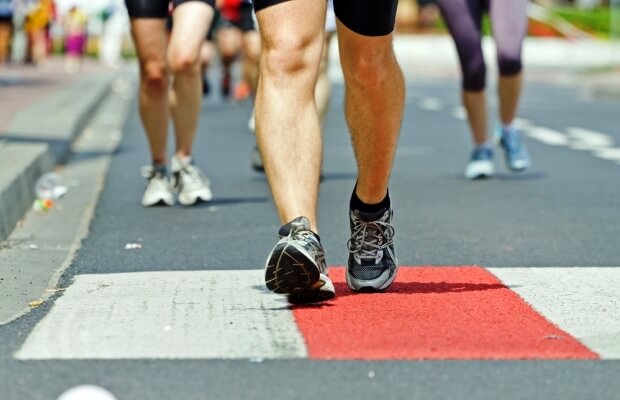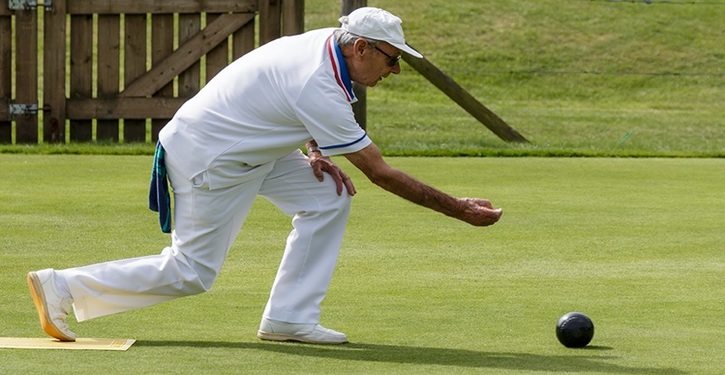Let’s be honest. We’re all in the same boat. Knees creak. Leaping out of bed in the morning has been replaced by a gentle stagger or occasionally a more refined roll. The local 5k run that used to be a doddle is now just a pipe dream.
Whether you used to play sport or not, it’s no secret that getting exercise is important in making the next few years as enjoyable as they can be. Eat well and exercise well. Walk.
It’s a simple four-letter word, but it comes in many forms. Yes, you can just ‘walk’ and that’s good for you. It stretches the limbs, but it can often be a solitary experience. Not to mention repetitive. Right leg. Left Leg. Repeat.
Enter walking sport.
When I first heard about walking sports, I thought it was an oxymoron. “Isn’t the whole point of sport to run yourself into oblivion, knock seven bells out of your opponent(s) or a ball, and then collapse into a shower and then a bar?” I wondered.
Well it used to be, in the days before creaking knees and staggering out of bed. Motivations change. Perhaps an injury or illness has jolted you into safeguarding your health, so you can enjoy time with the grandkids for longer. Maybe you enjoyed a kick-around in your youth, or were once a sports coach and fancy being ‘re-born’ as an athlete, albeit at a slower pace - your pace. You miss honing your skills, the exercise and enjoyment. Then there’s the social side – walking sports offer a fantastic opportunity to meet new people and have a laugh.
Walking sports do exactly what they say on the tin. There’s no running and no contact, but it’s by no means less intense, competitive or fun. In fact, it can be as energetic and exhausting as you want it to be. There’s a variety of walking at your fingertips – from walking netball to rugby and cricket – not to mention your feet, if you fancy yourself a walking footballer.
The sad truth is, there’s a perceived stigma around the word ‘walking’ – it has an undercurrent of shame, as if you can’t run anymore so ‘all you can do’ is walk.
But that’s seriously underplaying the benefits on both body and mind. Here’s how walking sports can kick your health into shape:
Get physical for a fitter future
Walking mobilises our bodies, waking up muscles that maybe weakening with age. Toning up bits of the body that long since forgot the meaning of the word. Stopping those hips and knees from stiffening into lampposts. Keeping shoulders and arms loose. And don’t worry if you’re recovering from an injury or operation – walking sports are a great way of re-introducing your body to movement. The consistent striding up and down a pitch works your whole body, or you can hone in on a specific area – for example, stretching your arms to shoot in netball builds strength in the upper body. Learning to measure your breathing and increase your time playing helps build endurance.
Walking sports are stop-start, which gets the heart pumping. In fact, research shows that walking improves cardiac risk factors such as cholesterol, blood pressure, diabetes, obesity and mental stress. Walking actually reduces the risk of cardiovascular events by 31%.*
Don’t worry. You’re not going to get hit by any flying tackles, and you don’t have to go hurtling off into the outfield trying to stop a boundary. That wouldn’t be good for your body! This is about walking. It’s about getting the buzz of playing, but at your pace. And it’s about your eyes being alert like they used to be, and your toes dancing but to a different beat.
It’s about feeling better within you and without you. It’s about those endorphins surging through your system and shouting ‘I’m alive again!’
That’s why walking sport was made for your body.
Move more for your mental health
The need to think on your feet keeps your brain active. It helps keep you alive, mentally and physically, and the mental side is often overlooked. When you play sport, you have to think: ‘Where’s the ball? Where’s my opponent? Who do I pass to? Where should I be?’ As the years go by, and especially in retirement, you don’t tend to have to make those instant decisions on a regular basis.
Physical activity boosts mental wellbeing – just 10 minutes of brisk walking increases mental alertness, energy and mood.2 Participating in regular physical activity improves self-esteem3 while reducing stress and anxiety**.
A session of walking sports also offers an escape from routine or any niggling worries or pressure you might be feeling. If you just want to meander around a football field or a netball court and occasionally get involved in the game you can. It can be what you want it to be. It’s as much about the ‘after’ as the ‘during.’ Forty minutes on a basketball court is the catalyst for the greater role that walking sport has to play, which is the sense of involvement with other people.
Playing walking sports is about today, but it’s also about revisiting yesterday. Kicking a ball around a pitch with the lads or ladies can be a nostalgic experience – from the friendly banter to the adrenaline, competition and sense of victory (or defeat, pushing you for ‘one more game’).
Widen your social circle through walking sports
It’s all about moving and thinking. And in the old days, probably about collapsing in a heap at the end. But now, it’s about something else – namely, the friendship and camaraderie that playing sport together provides like no other activity in life.
Social connections are vital at any life stage. Very few people after the age of 50 make ‘new’ friends, but if you’re lonely or alone, this a is a real way of bucking that trend. I’ve met so many walking sports players whose lives have effectively been re-booted by getting involved. That 2-3 hours of the week (usually 40 minutes to an hour of playing and then an hour plus chatting afterwards) become a key focal point of the week. They feel more alive then, than at any other period. I keep hearing the word ‘happy’ – they are genuinely happy meeting points of like-minded people. And when I think about my life, and the people who are real friends, they are without exception, from the sporting teams I was involved with in the past. Walking sport is not recreating the past. But it’s doing its best to make everyone realise there is still a lot of living to be done even when you reach your later years.
The health benefits are almost subliminal in that they will make you feel alive – and maybe happier – at having found something new in your life, at a time when that is unusual.
So what are you waiting for? Look for local walking sports teams in your area, or why not gather a group of friends together and approach a leisure centre near you about starting your own social group or even a team.

